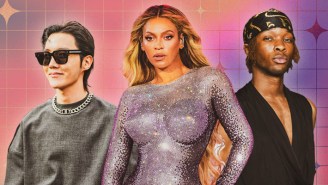Whenever Vince Carter returns to Toronto, as he did last Friday, talk inevitably turns to Carter’s legacy with the Toronto Raptors. Carter was the brightest star on the best team in franchise history, but the manner in which he exited still burns Raptors fans. Given all this, how should VC be remembered in Toronto when he eventually retires? Should his number be retired?
Carter was asked the question after the Mavs-Raptors contest on December 14, telling the Star-Telegraph, “I look at it as an honor to have my jersey retired because it’s an appreciation for the groundwork and the work that I’ve done here in the city. Why would I say no? Why would I decline that?”
I, for one, hope his 15 is eventually retired in Toronto. But I have a sneaking suspicion that I’m in the minority here.
Since Air Canada left Toronto on December 17, 2004, he has been perceived by Raptors fans as a whining, fragile malcontent who cheated his way out of town. There are plenty of reasons why: Attending his college graduation hours before Game 7 of the 2001 Eastern Conference Semifinals, allegedly tipping off Seattle Supersonics players to a last-minute play call, body-slamming head coach Sam Mitchell (again, allegedly), claiming that he “didn’t want to dunk anymore,” seemingly endless stints on the injured list (“Wince” is a common term of derision in T.O.), demonstrating a general indifference during games, and of course, demanding the trade that sent him to New Jersey for what basically amounted to Joey Graham.
Carter further provoked fans in a January 2005 interview with TNT’s John Thompson. When asked if he pushed himself as hard as he could have in Toronto, he replied, “In years past, no. I was fortunate to have the talent … you get spoiled when you’re able to do a lot of things. You see that you don’t have to work at it.
Now, with the all the injuries, I have to work harder. I’m a little hungrier. Getting a fresh start has made me want to attack the basket.”
Most Raptors fans seem unwilling to forget these instances, as evidenced by the customary booing he received last week at the Air Canada Centre, almost a decade after the trade.
Doing so, however, obscures all that Carter did in a Raptors uniform, and the impact he’s had since.
Individually, Carter enjoyed the most productive stretch of his career with the club, averaging 23.9 points (.448 field goal percentage), 4.0 assists and 5.3 rebounds a game, with a 22.1 PER from 1998-2004. He was awarded the 1999 Rookie of the Year, voted to five consecutive All-Star Games (2000-2004), and in 2000 and 2001 was named to the All-NBA Third and Second Teams, respectively. The latter was by far his best season statistically as he put up career-highs in minutes (39.7), points (27.6), three-pointers (2.2 a night on nearly 41 percent) and PER (25.0).
VC’s penchant for highlight reel slams during this time also made him one of the most exciting players in league. The impetus for this, of course, was the 2000 Slam Dunk Contest, in which Carter put down a series of extraordinary dunks that left fans, commentators and even his peers at courtside dumbfounded. Few on earth could dunk the ball with such style and flair as Half-Man, Half-Amazing could in his prime.
Likewise, the Raptors as a whole performed at their best with Carter on the team. In 2000, the club made its first ever postseason appearance against the New York Knicks (I actually had the good fortune of attending Game 3, the first NBA Playoff game held in Canada). The following year they finished the regular season with a franchise record of 47 wins, and as noted above, faced the top-seeded Philadelphia 76ers in the Eastern Conference Semifinals. Sadly, they suffered a heart-breaking loss in Game 7 when Carter’s potential game-winning fadeaway hit back iron (although it should be noted that Carter averaged 30.4 points a game in that series, including 50 in Game 3).
But Carter’s impact goes far beyond wins and losses. He was the face of basketball in Canada, and single-handedly made the Raptors relevant in the broader sports world. Unlike most other athletes to play up north, Vinsanity was able to transcend the 49th parallel: he was a prominent figure on American magazine covers, nationally televised games (NBC visited Toronto for the first time in the spring of 2000), commercials, and his own line of Nike signature sneakers.
“It was like Beatlemania,” one of Carter’s associates once told Robert MacLeod of the Globe and Mail during the height of his fame in 2004. “I remember coming out from a photo shoot or something and having to push our way through hordes of people to get into our limo.
“Once we were inside, people were climbing all over the car trying to catch Vince’s attention. People were even on the roof and the car was rocking back and forth and all these women had their faces pushed up against the windows. It was incredible.”
Altogether, this made it an exciting time to be a Raptors fan. Indeed, games at the ACC were consistently sold out, team merchandise was ubiquitous, and the country was suddenly abuzz about a winning team.
Perhaps more importantly in the Canadian context, the rise of the Raptors as a result of Carter’s presence helped develop the sport at a grassroots level as youth that might otherwise have played hockey began to lace up in basketball leagues instead (although Steve Nash is a significant source of spuriousness here). I was one of those kids. It should come as no surprise, then, that we are now seeing the largest and most talented pool of Canadian basketball prospects ever, including first round NBA Draft picks Tristan Thompson (Cleveland Cavaliers), Cory Joseph (San Antonio Spurs) and Andrew Nicholson (Orlando Magic); collegiate players Myck Kabongo (Texas), Anthony Bennett (UNLV), Kevin Pangos (Gonzaga) and Nik Stauskas (Michigan); and prep standouts Andrew Wiggins and Trey Lyles.
For better or worse, it’s hard to imagine how basketball in Canada might be different without Vince Carter. That is his legacy in Toronto. And it ought to be remembered.
Should Toronto eventually retire VC’s number?
Follow Tim on Twitter at @timboknows.
Follow Dime on Twitter at @DimeMag.
Become a fan of Dime Magazine on Facebook HERE.






